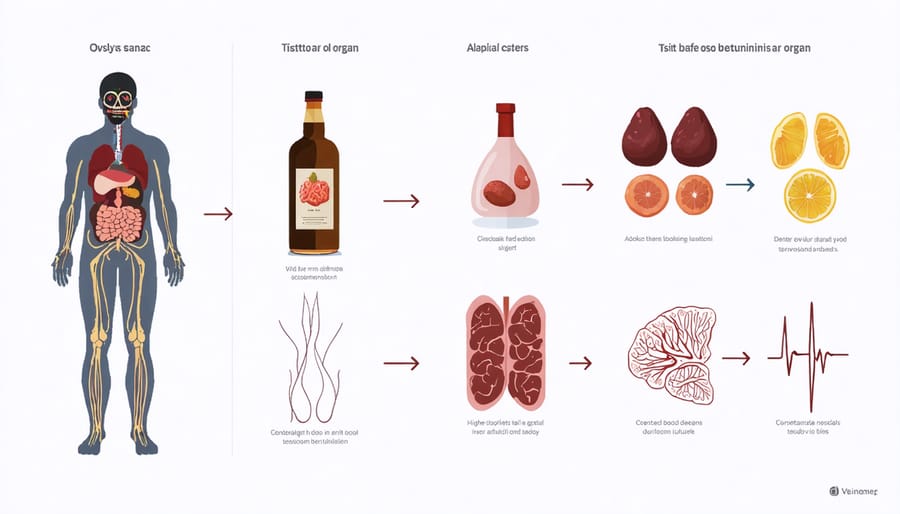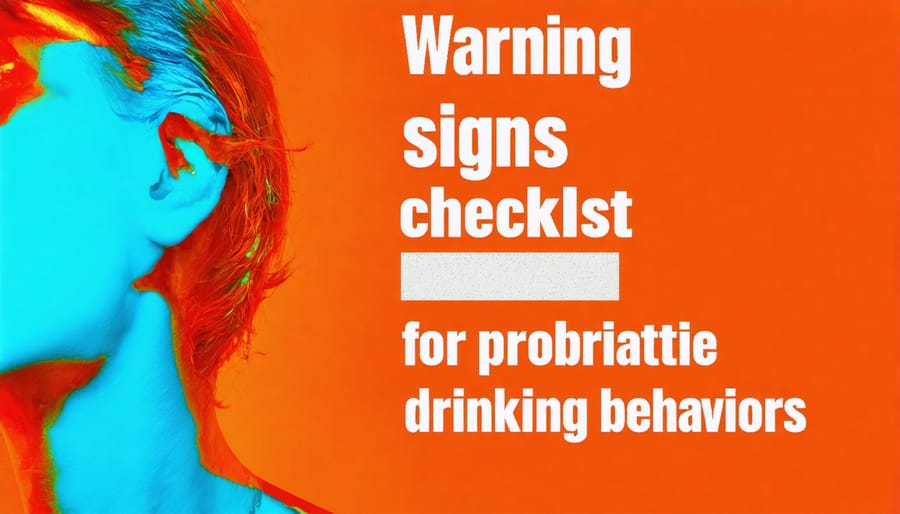
Choose lower-alcohol content alcohol beverages like beer, wine, or pre-mixed cocktails to reduce the risk of overconsumption. Set a personal limit before drinking and stick to it, alternating between alcoholic drinks and water. Eat a balanced meal before imbibing to slow alcohol absorption. Avoid drinking on an empty stomach or mixing alcohol with caffeine or other drugs. If you’re struggling with alcohol misuse, reach out for professional help – there is no shame in seeking support.

How does alcohol affect your body?
Short-term effects
Alcohol can quickly impact your judgment, coordination, and speech, even after just one or two drinks. You might feel more relaxed and confident, but this can lead to risky decisions and behaviors. Slurred speech and impaired motor skills are common, making tasks like driving or operating machinery dangerous. Alcohol also dehydrates you, potentially causing headaches, dizziness, and nausea. In higher doses, it can even lead to blackouts or memory loss. While enjoying a drink with friends can be fun, it’s essential to know your limits and drink responsibly to avoid these short-term pitfalls. Alternate between alcoholic beverages and water, eat before imbibing, and never feel pressured to overindulge. By pacing yourself and listening to your body, you can minimize the negative short-term effects of alcohol and wake up the next day feeling your best.
Long-term effects
Long-term alcohol abuse can have devastating effects on the body. One of the most well-known is liver damage, as excessive drinking can lead to fatty liver, alcoholic hepatitis, and cirrhosis. The risk of various cancers, including mouth, throat, liver, and breast cancer, also increases with chronic alcohol use. Heavy drinking weakens the immune system over time, making you more susceptible to infections and illnesses. It can also contribute to high blood pressure, heart disease, and stroke. Alcohol’s impact on the brain is significant too, potentially causing memory loss, learning difficulties, and mental health issues like depression and anxiety. Women are especially vulnerable to many of these long-term effects. If you’re concerned about your drinking habits, talk to your doctor – there’s no shame in seeking help. Small changes like cutting back gradually or finding alternative stress-relief methods can make a big difference for your health and well-being in the long run.
What defines moderate drinking?
Moderate drinking looks different for women and men due to biological differences. According to the Dietary Guidelines for Americans, low-risk alcohol consumption is defined as up to one drink per day for women and up to two drinks per day for men. A standard drink contains about 14 grams of pure alcohol, which is found in 12 ounces of regular beer, 5 ounces of wine, or 1.5 ounces of distilled spirits.
However, it’s important to note that moderate drinking isn’t a one-size-fits-all approach. Factors such as weight, age, overall health, and medications can impact how alcohol affects you. Some people, including pregnant women, those with certain medical conditions, and individuals recovering from alcohol use disorder, should avoid alcohol entirely.
If you choose to drink, do so responsibly and be mindful of your limits. Pace yourself, alternate between alcoholic and non-alcoholic beverages, and never drink and drive. Remember, even moderate alcohol consumption can carry risks, so it’s crucial to prioritize your health and well-being when making decisions about drinking.
Does alcohol really offer any health benefits?
While some studies suggest that moderate alcohol consumption may offer potential health benefits, such as reducing the risk of heart disease and type 2 diabetes, it’s important to approach these findings with caution. The research on alcohol’s health effects is often controversial and can be influenced by various factors like age, genetics, and overall lifestyle.
One key issue is defining “moderate” drinking. According to the Dietary Guidelines for Americans, this means up to one drink per day for women and up to two drinks per day for men. However, even at these levels, alcohol can still pose risks, including an increased likelihood of certain cancers, liver damage, and accidents.
It’s also worth noting that any potential benefits of moderate drinking can typically be achieved through other, safer means. Regular exercise, a balanced diet, and not smoking are all proven ways to boost heart health and lower disease risk without the drawbacks of alcohol.
Ultimately, the decision to drink is a personal one that should be made in consultation with your healthcare provider. If you do choose to imbibe, it’s crucial to do so responsibly and in moderation. And if you don’t drink, there’s no need to start for the sake of potential health benefits – focus instead on cultivating a well-rounded, health-promoting lifestyle that works for you.
How can you tell if you have a drinking problem?
It can be challenging to recognize when your drinking habits have become problematic. Some warning signs include frequently drinking more than intended, neglecting responsibilities due to alcohol use, experiencing strong cravings or urges to drink, and continuing to drink despite negative consequences like strained relationships or health issues. If you find yourself hiding your drinking from others, feeling guilty or ashamed about your alcohol consumption, or needing to drink more to achieve the desired effect, it may be time to reevaluate your relationship with alcohol.
If your drinking is causing problems in your life, such as impacting your work performance, damaging your relationships, or leading to legal troubles, it’s important to seek help. Regularly drinking to cope with stress, anxiety, or depression can also be a red flag. Remember, there’s no shame in admitting you need support. Reaching out to a trusted friend, family member, or healthcare professional is a brave first step towards addressing a potential drinking problem and improving your overall well-being.

What are some strategies for drinking responsibly?
Here are some practical strategies for drinking responsibly and enjoying alcohol responsibly:
First, set limits for yourself before you start drinking. Decide how many drinks you’ll have and stick to that number. Pace yourself by alternating alcoholic beverages with water or non-alcoholic options. This helps you stay hydrated and slows your alcohol consumption.
Be mindful of standard drink sizes – 12 ounces of beer, 5 ounces of wine, or 1.5 ounces of distilled spirits. It’s easy to overdo it when you’re not paying attention to how much is in your glass. Measure out drinks at home and order carefully when you’re out.
Never drink on an empty stomach. Eating a substantial meal before or while drinking slows alcohol absorption. Avoid salty snacks that make you thirsty and reach for protein-rich foods instead.
Have a plan for getting home safely. Designate a sober driver, call a cab, or use a ride-sharing service. Keep phone numbers handy if you need them.
Ultimately, listen to your body and know your personal limits. Don’t feel pressured to keep up with others. Drinking responsibly is about enjoying alcohol in moderation while taking care of yourself and those around you. With a little planning and mindfulness, you can savor your favorite beverages without going overboard.
In conclusion, understanding the basics about alcohol and its effects can help you make more informed decisions about your drinking habits. Remember, moderation is key – aim to stay within the recommended guidelines and be mindful of how much you’re consuming. If you choose to drink, do so responsibly and never get behind the wheel. Listen to your body, know your limits, and don’t be afraid to seek help if needed. By prioritizing your health and well-being, you can still enjoy alcoholic beverages as part of a balanced lifestyle. Cheers to drinking smarter, not harder!



